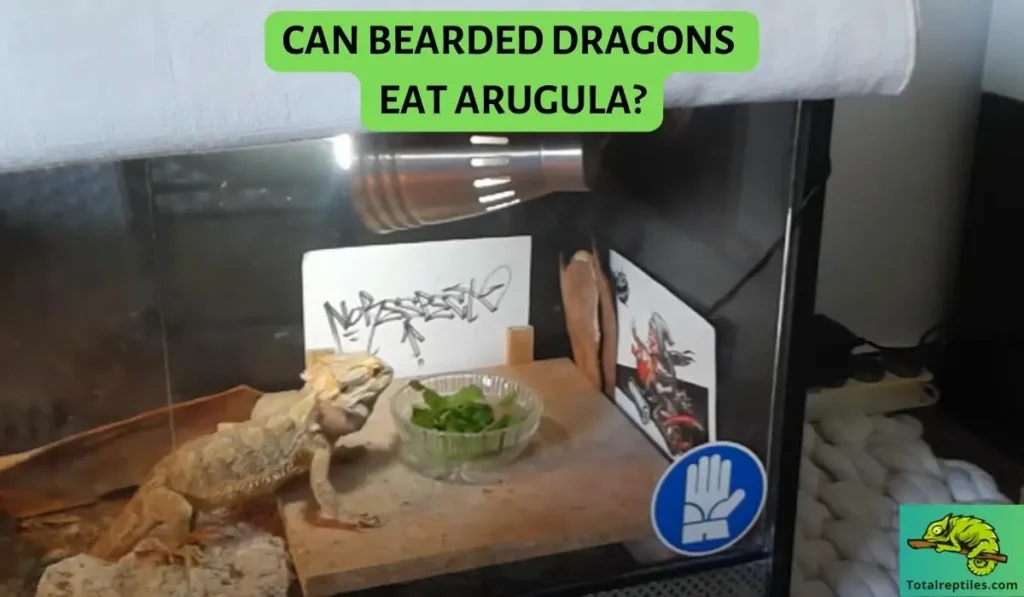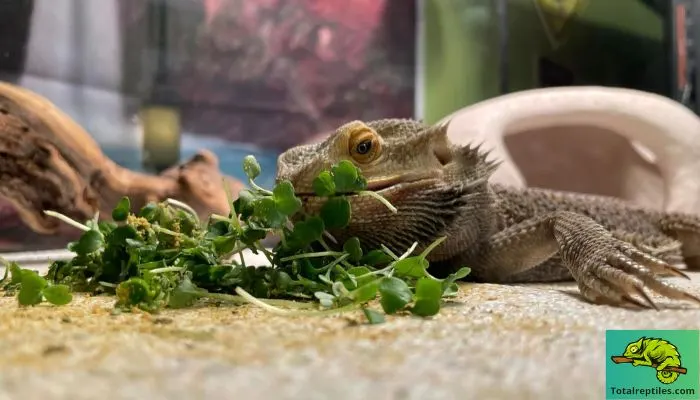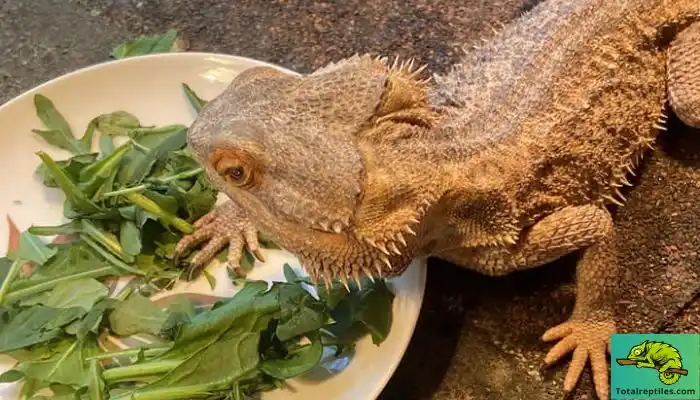The answer is yes, they can! Arugula, with its peppery and nutritious leaves, can be a valuable addition to a bearded dragon’s diet. But before sprinkling these leaves into their food bowl, there are important considerations to remember.
Arugula, also known as rocket or roquette, is a leafy green vegetable from the Brassicaceae family. This quick-growing plant has tender green leaves with a nutty flavor. This vegetable is a popular salad green used in many cuisines worldwide. But can our bearded dragon friends eat arugula, too?
In this blog post, we’ll explore the ins and outs of feeding this leafy green to your bearded dragon.

Nutrition values of Arugula
The nutritional values in the table above are based on USDA Food Data Central data. These values can serve as a reference for bearded dragon owners looking to ensure a balanced and nutritious diet for their pets:
Nutritional Values of Raw Arugula for Bearded Dragons (per 100g)
| Nutrient | Amount |
| Calories | 25 kcal |
| Water | 91.71 g |
| Protein | 2.58 g |
| Carbohydrates | 3.65 g |
| Fiber | 1.6 g |
| Sugars | 2.05 g |
| Fat | 0.66 g |
| Calcium | 160 mg |
| Folate | 97 µg |
| Phosphorus | 52 mg |
| Vitamin A | 2370 IU |
| Vitamin C | 15 mg |
| Vitamin D | 0 IU |
| Vitamin E | 0.43 mg |
| Vitamin K | 108.6 mcg |
- Vitamin K-Arugula is very high in vitamin K, with 108% of the RDI per cup. This vitamin helps blood clot and bones.
- Vitamin A – This leafy green includes vitamin A-converting beta-carotene. Vitamin A aids skin and eyes.
- Vitamin C – Provides immunity-boosting vitamin C at 17% of the RDI per cup.
- Folate – This plant is an excellent source of folate, a B vitamin that helps make DNA and new cells.
- Nitrates– Arugula contains higher levels of nitrates than other greens, which may provide cardiovascular benefits.
- Calcium – Some calcium helps with muscle and neurological functions.
- Iron– Small amounts of iron assist with oxygen circulation.
So, regarding nutrition, arugula seems like an excellent addition to a bearded dragon’s diet. Vitamin K, A, calcium, and antioxidants, in particular, help support a bearded dragon’s health.
Can Bearded Dragons Eat Baby Arugula?
You may also come across baby arugula at the grocery store, which has smaller and more tender leaves than mature ones. Baby leaves pack an even bigger nutrient punch than regular ones.

Per cup has higher amounts of:
– Vitamin K
– Vitamin A
– Vitamin C
– Calcium
The smaller, more tender nature of baby leaves also makes it easier for juvenile or baby bearded dragons to chew and digest.
For all these reasons, bearded dragons can eat baby arugula. The high vitamin, mineral, and antioxidant content offers nutritional value.
READ MORE: Can bearded dragons eat watercress?
What Are The Benefits of Feeding Arugula To Bearded Dragons?
Feeding these tangy leaves to bearded dragons can provide several benefits due to their nutritional content. Here are some potential benefits:
1. Excellent Source of Vitamin K
We mentioned that arugula is very high in vitamin K. This is excellent news for bearded dragons. Like us, reptiles need vitamin K for proper blood clotting and to maintain bone health and density. The high vitamin K in leafy greens prevents metabolic bone disease.
2. Boosts Immunity with Vitamin A & C
Bearded dragons don’t produce their own vitamin C like humans do. So, dietary vitamin C from fresh produce helps keep their immune system strong. The beta-carotene in arugula also provides vitamin A, another immune-booster.
3. Provides Calcium
Calcium is essential for proper bone growth and development in bearded dragons. A calcium source in their veggies helps balance insects and low calcium proteins.
4. Antioxidants Reduce Inflammation
The antioxidant kaempferol has been shown to decrease inflammation in animal studies. This may help bearded dragons avoid certain diseases associated with chronic inflammation.
5. Aids Healthy Digestion
Arugula’s fiber and water content improves digestion and prevents constipation, which can be a problem for some dragons. High water content of over 90% also provides great hydration.
6. Low Oxalates
Unlike some other greens, arugula is very low in oxalates. Oxalates can bind to calcium and inhibit absorption, so greens with minimal oxalates are ideal.
So, This plant has fantastic nutritional benefits, making it a great addition to a bearded dragon’s diet!
Why Can’t Bearded Dragons Eat Arugula Every Day?
While arugula has a stellar nutritional profile for bearded dragons, there are a couple of reasons why it shouldn’t be given as a daily green vegetable:
- Contains Goitrogens – Like all brassica family vegetables, arugula contains goitrogens, which can affect thyroid function by impacting iodine uptake. Overconsumption of goitrogens is causing hypothyroidism.
- Can Cause Loose Stools – Some bearded dragons seem sensitive to this leafy green vegetable’s higher fiber and water content. Eating it too often may cause temporary loose stools or diarrhea until the digestive system adjusts.
- High in Vitamin K – Excess vitamin K consumption could theoretically impact blood clotting, although this effect hasn’t been observed in reptiles specifically. Moderation is key with such high vitamin K foods.
- Should Eat a Variety of Greens – Bearded dragons should eat a wide variety of vegetables rather than just one type for optimal nutrition. Rotating different greens ensures they get a diversity of nutrients.
To avoid potential issues from overfeeding, best served in moderation as part of a varied diet.
How often can bearded dragons eat arugula?
Based on its nutrient profile and potential drawbacks, here are some general guidelines for how often bearded dragons can eat arugula:

Adult Bearded Dragons – Can eat arugula 2-3 times per week. Since adults are fully grown, they are less susceptible to overconsumption of goitrogens or vitamin K.
Juvenile/Baby Dragons – Can have 3-4 times per week. Baby dragons need more calcium and nutrients for growth, so a slightly higher frequency is beneficial.
Gravid Females – Best to limit to 1-2 times per week. Important not to overdo vitamin K consumption during reproduction.
Again, arugula should always be part of a varied salad with other greens like collard, mustard, turnip, endive, escarole, etc. Feeding a mix creates Balance for optimal nutrition. Veggies can make up 20-25% of the adult bearded dragon diet, more for juveniles.
Following these portions and frequencies of feeding allows bearded dragons to gain excellent nutritional value from this green without the potential for overconsumption. Pay attention to your individual dragon as well – their needs may vary slightly.
How to Feed Arugula to Your Bearded Dragon?
Here are some tips to safely feed arugula to your bearded dragon:
- Chop or tear leaves into bite-sized pieces to prevent choking.
- Rinse thoroughly to remove any pesticide residues, sand, or dirt. Pat dry before feeding.
- Mix chopped into a salad with other chopped greens for variety.
- For juveniles, choose baby leaves for easier chewing and digesting.
- Feed these leaves portion along with chopped vegetables and fruits.
- Make sure fresh, clean water is available at all times. Helps digest greens.
- Start with small portions of arugula to see if there is any digestive upset.
- Don’t use it daily. Follow recommended feeding frequencies.
- Look for organic arugula when possible to avoid pesticide exposure.
With proper preparation, portion sizes, and feeding schedules, arugula can provide great nutritional variety and health benefits to bearded dragons as part of a balanced.
Conclusion
To wrap up, arugula contains nutrients like vitamins K, A, and C, calcium, antioxidants, and more that can benefit bearded dragons. But its higher goitrogen content means should only be fed 2-3 times weekly in moderation.
Follow the age-specific serving guidelines, mix arugula with other greens, and encourage plenty of hydration. Incorporating this nourishing leafy green into a diverse diet can help keep your bearded dragon active, strong, and healthy!

